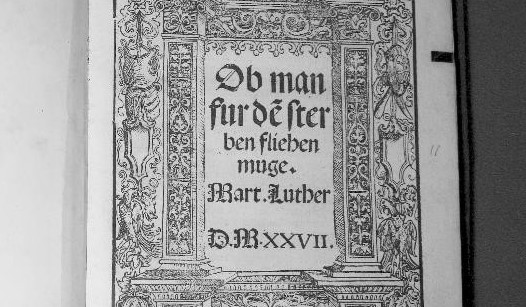This article was originally posted on the Taylor Reformation blog which has now become part of the Taylor Editions website with a dedicated Reformation Pamphlets series.
The Reformation is a time when the intense discussion of medieval (spiritual and physical) well-ness literature takes a new twist; Martin Luther contributes two texts in the early years of the Reformation, his “Sermon von der Bereitung zum Sterben” (how to prepare for death) from 1519 and his pamphlet “Ob man vor dem Sterben fliehen möge” (whether to flee the plague) from 1527. Both texts are in Taylorian – when you consult https://editions.mml.ox.ac.uk/topics/reformation.shtml and search for “Sterben”, you will find the 1519 Sermon in two later editions, Vienna 1522 and Basel 1523, and the second in the Wittenberg edition by Hans Luft of 1527: ARCH.8o.G.1527(6) Ob man fur dē sterben fliehen muge. / Mart. Luther D. M. XXVII. http://gateway-bayern.de/VD16+L+5520 https://flic.kr/p/VMWfQj
Astonishingly enough, much of the advice Luther gives when faced with “das Sterben”, i.e. the plague, stands the test of time: keep distance, air well, personal hygiene – but most importantly: act in a spirit of communal good and consider the well-being of all of society.
Credits: The text extract below was chosen by Dr Edmund Wareham who is currently working on the edition of another pamphlet from the Taylorian Collection, the “Passional Christi und Antichristi”. The translation was provided by Julia Bouquet who in February 2020 started an internship with Henrike Lähnemann. During that time in Oxford she prepared an xml-encoding for the pamphlet “Von der Freiheit eines Christenmenschen” for the quincentenary of its publication in 1520. The text is currently being uploaded by Emma Huber to the Taylor Editions website. The Oxford part of Julia Bouquet was cut short by the outbreak of the coronavirus but work continues: collaborating on the digital resources provides a welcome modern-day addition to Martin Luther’s advice from 1527.

Title page of Martin Luther’s pamphlet on how to deal with the Plague
Martin Luther, Ob man vor dem Sterben fliehen möge (1527)
Brauche der ertzney, nym zu dir, was dich helffen kan, reüchere haus hoff vnd gassen, meyde auch person und stett da dein nehester dein nicht bedarff odder auffkomen ist, vnd stelle dich, als einer, der ein gemein feur gerne wolt helffen dempffen, Denn was ist die pestilentz anders denn ein feur, das nicht holtz vnd stro, sondern leib und leben auffrisset. Vnd dencke, also, Wolan, der feind, hat vns durch gotts verhengnis gifft vnd todlich geschmeis herein geschickt so wilich bitten zu Gott, das er uns gnedig sey vnd were. Darnach wil ich auch reǔchern, die lufft helffen fegen, ertzney geben vnd nemen meiden stet und person, da man mein nichts darff auff das ich mich selbs nicht verwarlose, und dazu durch mich villeicht viel andere vergifften vnd anzunden mochte und yhe also durch meine hinlessickeit ursach des todes sein, Wil mich mein Gott dar uber haben, so wird er mich wol finden, so hab ich doch gethan, das er mir zu thun gegeben hat und bin widder an meinem eigen nach ander leute tode schüldig, Wo aber mein nehester mein darff, wil ich widder stett noch person meiden, sondern frey zu yhm gehen, und helffen, wie droben gesagt ist, Sihe, das ist ein rechter gott fǔrchtiger glaube, der nicht thǔmkune vnd frech ist, und versucht auch Gott nicht.
Martin Luther, Whether to Flee the Plague (1527)
Make use of medicine, eat what may help you, smoke out private and public places. Avoid other persons and places if not needed by your neighbour or which are busy. Act like somebody who wants to help put out a public fire. Because what is the pestilence other than a fire, that does not consume wood and straw, but life and limb. Rather think: true, the enemy has sent us, sanctioned by God, poison and deadly vermin, therefore I shall pray to God to have mercy upon us, now and forever. But then I will continue smoking out, help to let in fresh air, provide and take medicine, avoid places and people where and when I am not needed in order to avoid getting into a bad state myself (and potentially even pass on the poison and fire to many others and through my negligence become the cause of their death). If God wants to call me to Him, He will find me, but I will have done everything within my power to comply with His order and will not be guilty of either my own or other people’s death. But whenever my neighbour needs me, I will avoid neither places nor people, but approach them willingly and help as mentioned before. Now, this is the right God-fearing faith that is not rash or reckless nor tempting God.
